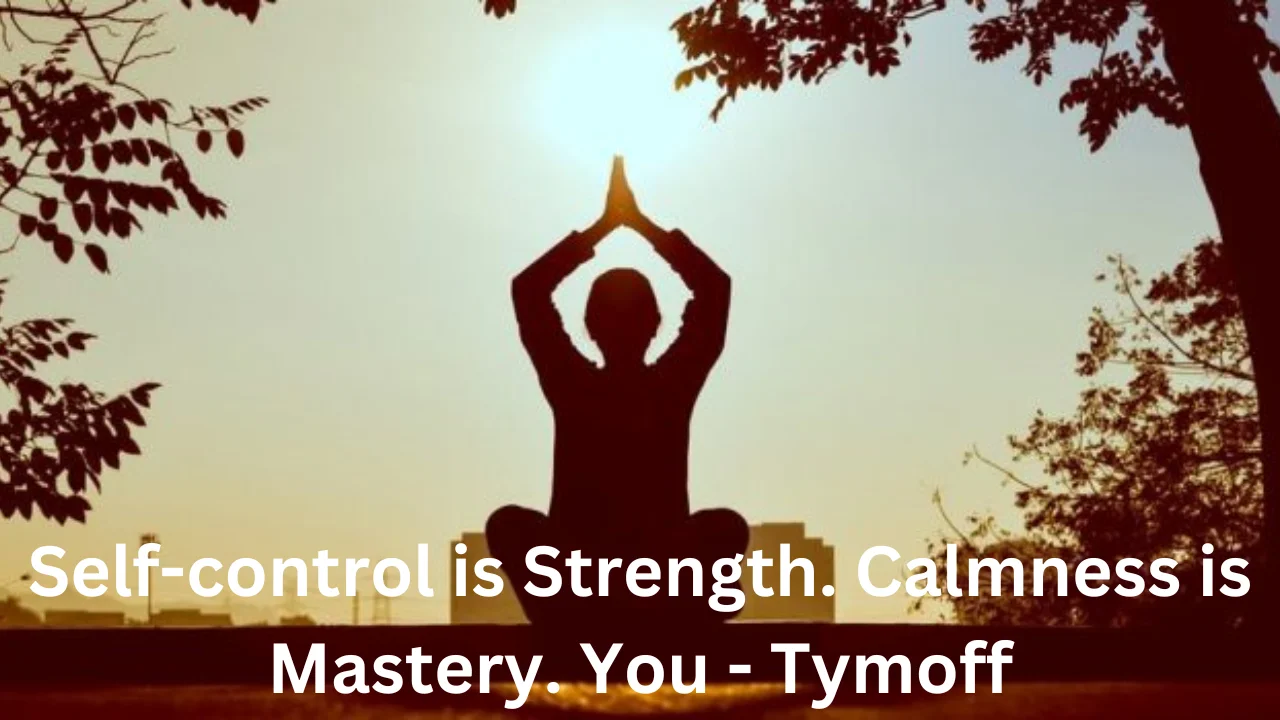
Calmness and self control are essential skills everyone should develop. Self-control means controlling your emotions, thoughts, and behaviours in a way that helps you achieve your goals. Being calm refers to staying composed even during stressful times. Practising self-control and maintaining calmness can benefit you and help you take charge of your life. Lets read and learn more about Self-Control is Strength. Calmness Is Mastery. You-Tymoff
Understanding Self-Control:
Self-control is the cornerstone of emotional regulation and behavioral management. It involves the ability to restrain impulses, manage emotions, and exert discipline over one’s actions. Tymoff posits that self-control is not merely a passive state but an active skill that can be developed through conscious effort and practice. By mastering self-control, individuals can navigate challenges with resilience and achieve their goals with greater efficacy.
The Strength Within:
Tymoff’s philosophy underscores the idea that self-control is synonymous with strength. In exercising restraint and discipline, individuals tap into their inner reserves of power and fortitude. Rather than succumbing to immediate gratification or impulsive reactions, those who embody self-control demonstrate resilience and endurance in the face of adversity. This strength serves as a foundation for personal growth and accomplishment.
Cultivating Calmness:
Calmness is not merely the absence of turmoil but a state of inner peace and serenity. Tymoff emphasizes the importance of cultivating calmness as a pathway to mastery. When faced with challenges or setbacks, maintaining a composed and tranquil demeanor enables individuals to think clearly and make sound decisions. Calmness fosters resilience, enabling individuals to navigate turbulent waters with grace and poise.
The Mastery Mindset:
Mastery is the culmination of disciplined effort and continuous improvement. Tymoff asserts that true mastery is not achieved through external validation or accolades but through the internal journey of self-discovery and growth. By honing their skills and refining their craft, individuals can attain mastery in their chosen endeavors. This mastery is characterized by confidence, competence, and a deep sense of fulfillment.
The Intersection of Calmness and Self-Control:
Calmness and self-control are intertwined qualities that reinforce one another. Tymoff argues that by cultivating calmness, individuals can enhance their capacity for self-control, and vice versa. When faced with challenging situations, maintaining a calm and composed demeanor enables individuals to exercise greater self-control over their thoughts, emotions, and actions. Conversely, practicing self-control fosters inner peace and tranquility, contributing to a sense of overall well-being.
How Can We Develop Self-Control?
Developing strong self-control takes practice but becomes a handy life skill. Here are some practical ways to build self-control
- Practice Mindfulness: Mindfulness means paying attention to the present moment non-judgmentally. Mindfulness trains the brain to notice and delay reactions, helping improve impulse control.
- Use Delayed Gratification: Work on waiting for rewards, whether a snack or a fun activity. Train the brain that pleasures can be moderate and still enjoyable.
- Create an Environment That Supports Your Goals: Remove potential triggers from surroundings that may activate undesirable habits. Design environments that naturally enable good choices.
Practical Strategies for Development:
Tymoff advocates for practical strategies to cultivate calmness and self-control in everyday life. These may include mindfulness practices, such as meditation and deep breathing exercises, which promote self-awareness and emotional regulation. Additionally, developing healthy habits, such as regular exercise and adequate sleep, can support optimal cognitive functioning and impulse control. Setting clear goals and prioritizing tasks can also help individuals stay focused and disciplined in pursuit of their objectives.
The Impact of Self-Control and Calmness on Success
Mastering self-control and maintaining calmness provides significant advantages on the road to success:
- Effective Decision-Making: Cool-headed choices factor in rational priorities with discipline and patience, and Opportunities are optimized.
- Enhanced Productivity: Focused work habits maximize outputs without distractions from lack of composure or impulse. Multi-tasking thrives.
- Positive Relationships and Collaboration: Self-control supports cooperation under challenging discussions. Calm openness fosters teamwork and understanding among others.
- Leadership Excellence: Leaders with fortitude in trying times and clarity under pressure gain respect and followership for fair-minded guidance in turmoil through composure.
The Journey of Self-Discovery:
Ultimately, the journey towards calmness and self-control is a deeply personal one. Tymoff encourages individuals to embark on this journey with openness and curiosity, embracing both the challenges and the rewards that accompany it. By cultivating a mindset of continuous learning and self-improvement, individuals can unlock their full potential and achieve mastery in all aspects of their lives.
Conclusion:
In conclusion, Tymoff’s philosophy underscores the profound significance of calmness and self-control in achieving mastery. By harnessing the strength within and cultivating a mindset of discipline and tranquility, individuals can navigate life’s challenges with grace and achieve their fullest potential. Through conscious effort and practice, we can all strive towards embodying the qualities of calmness, self-control, and mastery in our lives.






